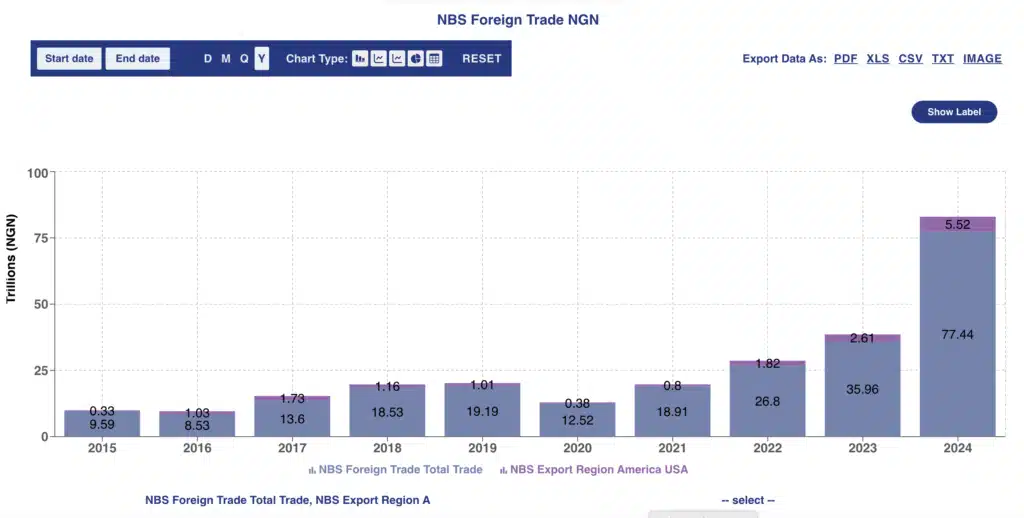In a landmark policy shift that is set to reshape global trade dynamics, U.S. President Donald Trump has officially announced a sweeping new tariff policy, imposing a baseline 10% tariff on all U.S. imports. Additionally, the administration has introduced a system of targeted reciprocal tariffs aimed at countries that impose significantly higher duties on American goods, signaling a firm stance on trade fairness and industrial revitalization.
As part of this aggressive new policy, Nigeria will now face a 14% tariff on all its exports to the U.S., a move directly responding to the Nigerian government’s existing 27% tariff on American goods. This measure is part of Trump’s broader economic strategy, which he has termed an effort to “supercharge America’s industrial base” and “end exploitative trade practices that have hurt American workers and manufacturers.” The White House statement emphasized that this policy is designed to push for “fair and balanced trade,” aligning with Trump’s long-standing “America First” agenda.
The new tariffs were unveiled during a high-profile White House event dubbed Liberation Day, symbolizing a decisive shift away from the traditional free-trade principles that have guided U.S. policy for decades. With immediate effect, these tariffs apply to more than 50 nations across multiple continents, including major trade partners such as China, the European Union, India, and Japan, as well as several African, Latin American, and Asian nations. The policy is expected to have widespread economic implications, reshaping the cost of goods and influencing trade negotiations worldwide.
According to Nigeria’s National Bureau of Statistics (NBS), trade between Nigeria and the U.S. has totaled a staggering N31.1 trillion between 2015 and 2024. During this period, imports from the U.S. accounted for N16.4 trillion, making up 8.7% of Nigeria’s total global trade volume. However, the past few years have seen a consistent decline in Nigeria’s exports to the U.S., primarily driven by a reduction in crude oil purchases by American buyers. This shift in trade balance raises concerns about Nigeria’s future position in the U.S. market, particularly as these new tariff policies take effect.

[strong data-start="1293" data-end="1324"]Africa among those impacted[/b]
The repercussions of this policy extend far beyond Nigeria, affecting several other African nations that engage in substantial trade with the U.S. The administration’s newly introduced reciprocal tariff system means that countries with high tariffs on American goods will now face counterbalancing U.S. tariffs at half the rate of their existing duties. The affected African countries and their revised U.S. tariff rates include:
[strong data-start="1391" data-end="1404"]Mauritius[/b] – U.S. to impose a 40% tariff in response to Mauritius’ existing 80% duty on American goods.
[strong data-start="1483" data-end="1494"]Algeria[/b] – The U.S. government will apply a 30% tariff on Algerian imports, equating to half of Algeria’s steep 59% tariff on American goods.
[strong data-start="1580" data-end="1591"]Namibia[/b] – A 42% tariff has been imposed on Namibian imports, reflecting the country’s 21% duty on U.S. goods.
[strong data-start="1610" data-end="1621"]Lesotho[/b] – Lesotho will face a significant 99% tariff, mirroring half of its existing 50% levy on U.S. exports.
[strong data-start="1640" data-end="1649"]Kenya[/b] – A 10% tariff will now apply to Kenyan imports, matching Kenya’s 10% duty on American products.
[strong data-start="1668" data-end="1688"]Ghana & Ethiopia[/b] – These nations have historically imposed tariffs of 17% and 10% on U.S. goods, respectively, and will now see identical tariffs imposed on their exports to the United States.
This tariff strategy is an integral part of Trump’s broader Make America Wealthy Again initiative, which aims to create a more balanced global trade framework by ensuring that American goods are not subject to unfairly high import taxes while competing in foreign markets. Under the new policy, countries with the highest tariffs on U.S. goods—including Vietnam, Cambodia, and Bangladesh—will now face stringent U.S. import tariffs ranging between 37% and 49%.
The implementation of these tariffs is expected to have significant consequences, particularly for African economies that have benefited from preferential trade agreements with the U.S., such as the African Growth and Opportunity Act (AGOA). For Nigeria, the policy poses a direct challenge to its trade strategy, forcing the country to reassess its tariff structure to maintain its access to the world’s largest consumer market. Without adjustments, Nigerian exporters may find themselves at a disadvantage, struggling to compete in an increasingly protectionist trade environment.
As the new tariffs take effect, analysts predict potential disruptions across key sectors, particularly in industries reliant on U.S. trade partnerships. In the coming months, diplomatic negotiations and trade policy adjustments will play a crucial role in determining how countries, including Nigeria, navigate these evolving economic challenges. Whether these tariffs will ultimately lead to trade renegotiations or increased economic strain remains to be seen, but the global impact of this policy is already unfolding.

